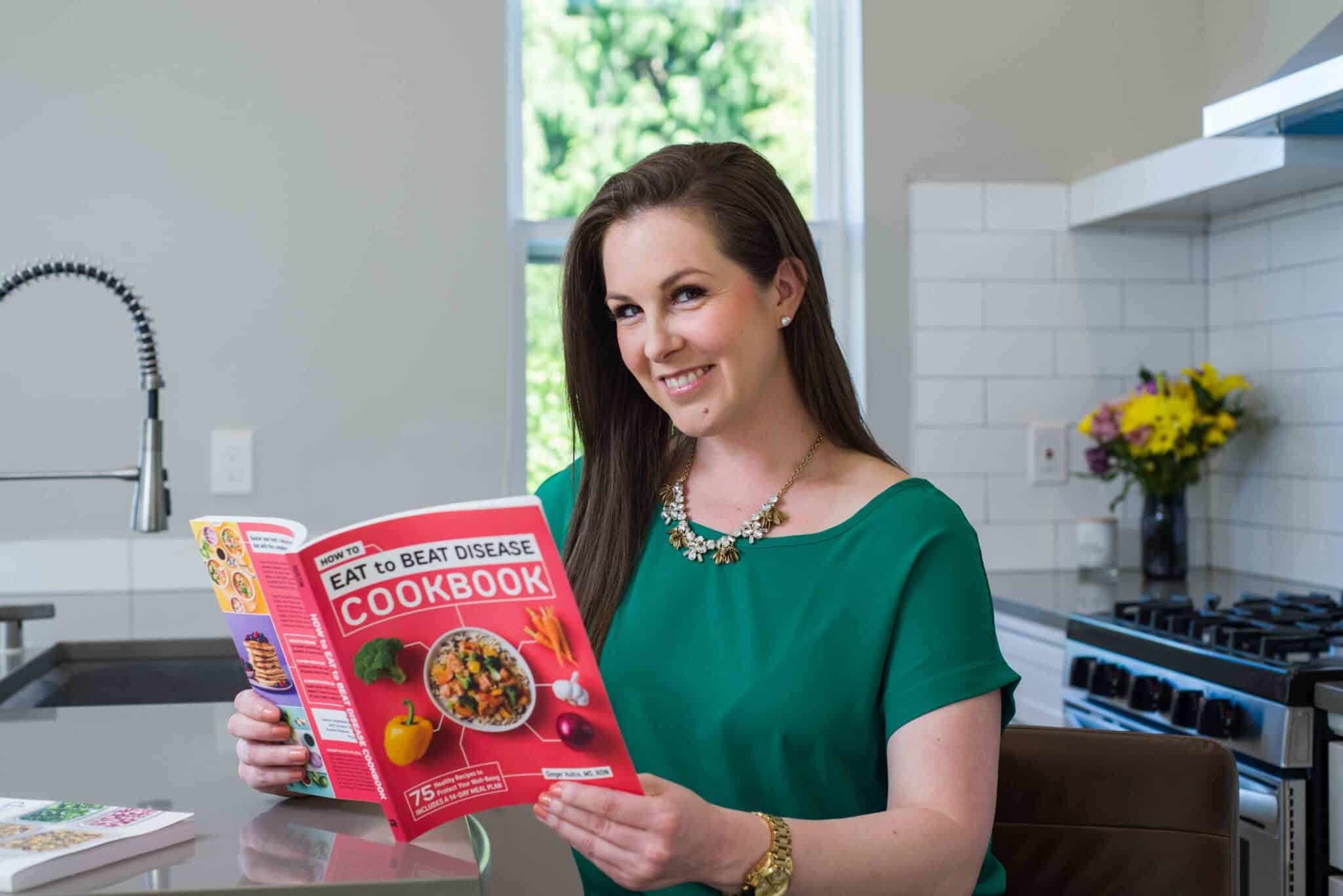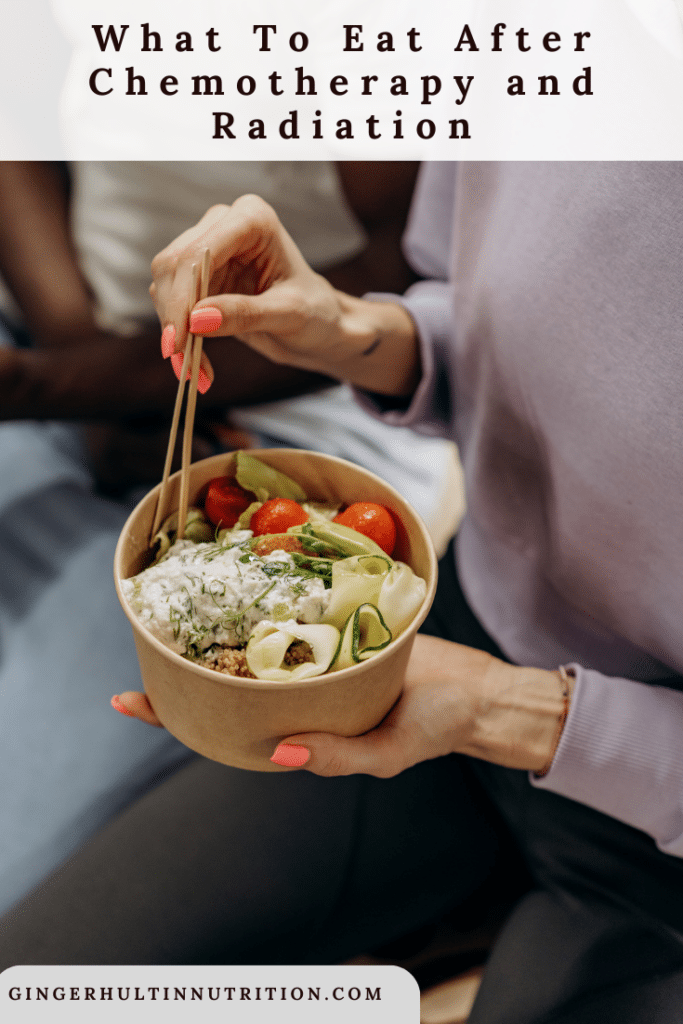What To Eat For Your Diet After Chemotherapy and Radiation
August 28, 2023 by Ginger Hultin MS RDN
Today, I’m excited to introduce a new member of my team who has some absolutely fascinating nutrition advice for you based on her own experience. Gwynne is a 25 year old cancer survivor who is working towards a degree in oncology dietetics, like me. She was diagnosed with Hodgkin’s lymphoma while at college in 2019, and has since been trying to connect her love of food to helping others with cancer experience. A self-identified foodie, her relationship with food changed dramatically during her treatment, and she was given very little guidance concerning her diet. This made her determined to help others feel less confused and alone when it comes to eating while undergoing chemotherapy or radiation. She is applying to graduate school at Jefferson University in Philadelphia for their nutrition program in 2024. Thanks, Gwynne, for sharing your story with my community!
There is nothing worse than facing a plate of what used to be your favorite food and feeling as if you are going to be sick. Treatments for cancer and autoimmune diseases can make even the biggest food enthusiast feel nauseated at the thought of eating, leading to weight loss and exhaustion. Your diet while undergoing treatments like chemotherapy and radiation is a topic too rarely talked about by doctors, yet is some of the most critical information that you need when navigating a diagnosis or treating a chronic condition. Food can not only give you the strength you need to heal, but it can even help ease side effects and help to jumpstart your overall recovery. Let’s talk about your diet after chemotherapy and radiation with some advice from my guest expert, Gwynne, and her personal experience.
Timing (of eating) is Everything
One of the most helpful eating practices Gwynne found when going through her own treatment was timing. She never wanted to eat anything when the traditional time for a meal came around, so snacking throughout the day was the best way to ensure that as many nutrients as possible. For example, you can break up having small snacks around 10am, 1pm, 3pm and 5pm as well as something during traditional meal times if possible. You can also try to plan meals around eating with people in order to encourage your appetite. This makes eating in general a lot easier.
An interesting discovery Gwynne made is that eating within an hour after she finished up chemo improved my overall recovery tenfold. If she had a light and nutritious meal as soon as she got home, she would feel better overall for the next two weeks. Some people may find that eating beforehand is also beneficial, such as an hour or two before so that you have something in your stomach. This may not work for everyone though, as Gwynne personally would feel nauseous if she ate too much before heading to the hospital. Everyone is different, and you should try out multiple routines to see what works best for you.
Diet After Chemo and Radiation
Your choice of the kinds of food you eat is also important when considering your diet after chemotherapy and radiation. Many people find that they prefer cool or lukewarm foods to hot ones, as hot foods can create smells that may not be tolerated well with nausea or food aversions. At Ginger Hultin Nutrition, the RDN team often suggests smoothies which can be a really easy way to get nutrition in.
Mild, nutritious foods tend to be the most agreeable for your diet after chemo and radiation. Foods with spice or excessive salt can be dehydrating or cause intestinal discomfort. The following are great meal options when breakfast, lunch or dinner time comes around:
- Buttered pasta (consider whole wheat or bean pasta to boost protein and fiber. Feel free to use non-dairy butter or olive oil instead)
- Low-sodium chicken noodle soup
- Miso soup with mushrooms and potatoes. Bonus: add tofu for more protein!
- Peanut butter, dark chocolate, and banana smoothie
- Plain, refrigerated chicken (you can chop it up and use it in many ways or have it just on it’s own)
- Poached or fried eggs on toast. Be sure to get pasteurized eggs and/or cook them fully if food safety is an issue due to low blood counts.
- Rice cooked in bone or vegetable broth. Congee is very soothing!
- Toasted bagels with peanut butter and jelly or cream cheese
- Yogurt with fruit. If you can tolerate it, granola can be helpful, too
Stanford Medicine has a great list of options for eating before and after chemotherapy if you need more ideas. By eating these basic but nutritious meals, you are giving your body the energy it needs in order to boost its immune system and promote overall well being. Not only are these foods nutritious, but many are considered “comfort” foods that you would have in childhood when you were sick. Food should of course be nutritious, but they should also bring you comfort and fond memories when you eat them. Your diet after chemo and radiation should bring you joy whenever possible. Things like smell and taste are our strongest memory triggers, and what better time to recall feeling safe and taken care of?
So should foods you eat during cancer be ‘healthy’? Yes! Of course. However, we have to make sure that you’re getting enough calories and protein and sometimes that means listening to your body and “what do I need today?” “what can I tolerate right now?”. Ginger and her team partner with their clients to help them eat a balanced, nutritious diet that also makes them feel good every step of the way during treatment. And that can change over time. It’s a journey.
Diet After Chemo to Help Side Effects
Gwynne personally found that the food she ate lessened my side effects from treatment dramatically. For nausea, ginger tea was the only thing that helped, both due to the taste and the ‘heat’ in her stomach. When constipation hit for weeks, black tea and a box of raisins always did the trick. Below is a list of common side effects and the foods that can help alleviate them:
Nausea and Vomiting
Ginger tea or candy has long been used to soothe the stomach because it contains gingerol, which benefits gastrointestinal motility. Bone broth is packed with nutrients and is easier to keep down when nauseous – remember, you can use plant-based broths, too. Saltines are often the recommended ‘sick food’ by doctors, most likely because they produce no smell, making them easy to eat and replenishing the body with salt after vomiting or when feeling nauseous. Remember, there are lots of different types of crackers – gluten-free, etc – that you can try to see what works best for you.
Body Aches
Carbs such as whole grain bread help replenish muscle fuel stores in your body. Whole grains also offer a range of nutrients including fiber, protein, B vitamins, iron, zinc, magnesium and copper. Watermelon is also a great option because it contains the amino acid l-citrulline, which has been shown to soothe aching muscles for athletes (and for folks during treatment!). Legumes like lentils or edamame (check out Ginger’s edamame pasta salad recipe here) are another great food filled with zinc, which is known universally for its healing properties and supports protein synthesis.
Mouth sores
Avoiding acidic and spicy food is the primary goal of treating mouth sores. Eating cold items like ice cream and popsicles help soothe sore mouths during treatment and provide the necessary nutrients to heal. Smoothies and protein shakes are great because they do not need to be chewed and do not irritate the sores.
Constipation or diarrhea
The BRAT diet (bananas, applesauce, rice, toast) is often recommended by doctors when you are suffering from constipation or diarrhea (see Ginger’s recent post on natural constipation relief linked here). If you’re seeking higher fiber for constipation, choose brown rice and whole wheat toast. If you’ve got diarrhea, less fiber is better so white rice and white toast are easy to digest. There’s controversy whether or not that diet is evidence-based. That being said, our team has found that these foods are well tolerated and can actually help quite a bit. Apple and prune juice contain sorbitols, which are not broken down in digestion and are quickly expelled by the body when they reach the colon so those can be great choices to alleviate constipation naturally.
Fatigue
Oatmeal is a great source of energy because it is high in fiber and protein, and it has a low glycemic index, which means it won’t tank your blood sugar. Packed with potassium, bananas are filled with beneficial vitamins and are a slow-digesting complex carbohydrate, meaning that it will fuel you for hours. Dark chocolate is a natural caffeine boost but it also has a plethora of antioxidants that could be beneficial during treatment..
It’s important to eat food that won’t irritate or cause further side effects from treatment. For example, if you have mouth sores, choose soft foods like yogurt or shakes. If you are experiencing constipation, try to add more fiber into your diet to move your gut along. If you feel nauseous, nibble on a cracker. Be sure not to force yourself to eat foods you enjoy, as this can cause an aversion to them. And of course, be sure that you’re talking to your medical team during all of this because if a side-effect is caused by a medication, then often you need medications to help treat or alleviate them. Your medical team should be a trusted ally during treatment. You should also have a registered dietitian on your team from the start!
Listen to Your Gut
It may sound corny, but listen to your gut (pun intended)! Everyone is different, and no one but you knows what works best for your body. There will most likely be a lot of trial and error as you explore your diet, but what matters is that you are being gentle with yourself and listening to what your body tells you. Working with a dietitian to plan out your diet after chemo and radiation will guarantee that you are getting the nutrients that you need to kick butt and keep your body going during this exhausting time. Remember to check out some of Ginger’s recipes below:
Chocolate Chia Pudding with Coconut Milk
Vanilla Almond Coconut Chia Pudding
Easiest Blueberry Coconut Oatmeal Bake
Anti-inflammatory Cinnamon Overnight Oats
So tell us – whether this speaks to you or someone you know – which of these tips work for you? Are we missing anything? Drop us a comment below –

Ginger Hultin,MS, RD, CSO
Thanks for visiting! If you're struggling with a cancer diagnosis, autoimmune condition, gut health problems, or even a medical mystery, nutrition can make a HUGE difference in your day-to-day life. I run a virtual, concierge private practice where I partner with my clients over time to help them improve their health through nutrition. Be sure to visit the blog for easy, plant-based, anti-inflammatory recipes and our "Resources" page for a variety of self-paced programs, books, e-books, and nutrition podcast episodes.




